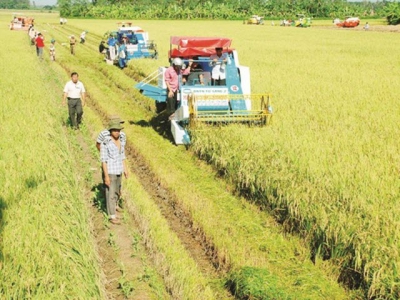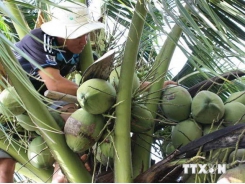Agriculture must remove the barriers in land accumulation for taking off

Despite great efforts and changes, until now the land accumulation, creating momentum for the development of high-tech agriculture, thereby promoting the "taking off" of agriculture still meet many difficulties and obstacles. To resolve this, many localities proposed the Government to quickly amend and complete the Land Law 2013.
Abolishing the land limit is one of the feasible solutions to solve difficulties in land accumulation . Photo: ST.
The "bottleneck" is the policy
According to Tran Thi Thanh Nhan, Head of the survey team on land transfer and accumulation, the Institute of Policy and Strategy for Agriculture and Rural Development (MARD), more than 70% of the land for agricultural production in Vietnam have areas of less than 0.5 ha. This is quite different from other countries in the region. Thailand, for example, has 1.4 million plots of land with area of over 22 ha (according to 2012 data). In China in 2013, there were 8.82% of the area of over 3 ha / plot. Researching and surveying in Ha Nam, An Giang, Hoa Binh, Lam Dong, which represent the production areas showed that agricultural land is very fragmented. The land accumulation of Vietnam is quite slow and the transfer of land use rights, lease of land use rights still meet a lot of difficulties.
Among the provinces in the country, Ha Nam is a breakthrough in the accumulation and gathering of land to attract investment in high-tech agricultural production. Mr. Ngo Manh Ngoc, Deputy Director of Ha Nam Department of Agriculture and Rural Development said that the province has piloted the mechanism of land accumulation in the direction that the authorities at district and commune level lease lands to farmers for 20 years, then the provincial level sign re-leasing contract of land with enterprises with the time and price signed with the farmers. The certificates of agricultural land use rights remains unchanged. The provincial budget will pay the land rental fee to the farmers for 20 years, then enterprises pay the land rental fee for the first 10 years as soon as signing the contract, and after the 10 years, will pay the rest of the amount. To date, the province has planned 16 hi-tech agricultural zones, 2 zones have been put into operation; there are 67 chain linkage models with an area of 1,160 ha of 2,200 households engaging in clean agricultural production.
However, Ngoc also emphasizes that there are still many difficulties and obstacles in the process of land accumulation in Ha Nam, especially obstacles related to the policy. "At present, the authorities at all levels are not allowed to lease land from the people and re-lease it to enterprises. The reason is that, the Land Law 2013 does not regulate that the authorities at all levels are allowed to lease land use rights from the people. In addition, the Budget Law also does not allow the budgetary advance to pay the land lease fee to the people then collect repeatedly from the enterprise to repay. In addition, regulations on land limit have restricted households to accumulate and gather land. To achieve 180 ha of land allocated to enterprises, the authorities have to gather land from more than 2,000 households," said Ngoc.
Revising the Land Law 2013 soon
Regarding difficulties in the land accumulation, the representative of the Land Management Department of Hoa Binh province said that Hoa Binh has a complex terrain and agricultural land has been allocated to households in the province in a fragmented manner, which are not convenient for large-scale production. Notably, the most difficult now is the agreement mechanism. "In some cases, enterprises successfully negotiate with 90% of households, but if only 10% of households do not agree, then the project is considered as a failure. While the risk of investment in agricultural production is significant, so enterprises are very afraid of it," the representative added.
According to Ms. Nhan: In the form of farmer and farmer transactions, there are mainly verbal agreements. In the form of allowing enterprises to lease land, which is more popular, but it still has shortcomings when enterprises directly lease land from the people, because it will be difficult due to high transaction costs and risks for both parties. If enterprises lease land from the State, this form is difficult because this land fund is increasingly limited. The third form is that the State leases land from the people and then re-leases it to enterprises, which has been implemented in Ha Nam and Lam Dong. This form has achieved some results but is now entangled in law, institutions and risks if enterprises fail to implement the contract. "The state needs to issue clear policies and legal framework so that the people can feel safe to transfer or lease land to enterprises without worrying about the loss of assets or other disadvantages, and enterprises feel worry-free when their assets are assured when investing in those land plots. The clear policies will avoid the breaking of the contract," she said.
In this regard, Mr. Nguyen Do Anh Tuan, Director of Institute of Policy and Strategy for Agriculture and Rural Development, commented: "Land is the first step in agricultural development breakthrough, especially when Vietnam moves to the new period, agriculture has a new function, which is the agricultural economy, which emphasizes the use of science and technology, attracts enterprises to the chain. To this end, especially when Vietnam moves to the new period, agriculture is a new function, which is the agricultural economy, which emphasizes the use of science and technology, the land market must operate. Therefore, it is necessary to abolish the land limit and restrict the transaction objects. In addition, it needs clear data and information dossiers on land, promotes the re-granting of land use right certificates; adjusting land valuation, transaction procedures, assessment, etc," Tuan stressed.
From a local perspective, Mr. Ngoc expressed: In order to promote the development of hi-tech agriculture, the Government, the Prime Minister and other ministries and sectors at the central level are required to consider and propose the National Assembly to amend and supplement the Land Law 2013 soon. In addition, Ngoc suggested the Government to soon approve the pilot scheme of land accumulation to attract investment in hi-tech agriculture development in Ha Nam and Thai Binh provinces.
Representatives of some localities also requested the Government to consider and direct the specialized agencies to study and amend the provisions of the Civil Code, the Law on Credit Institutions on the mortgage of assets for agricultural projects so that enterprises, cooperatives, farmer groups investing in this sector can access the credit loans; requested the Ministry of Natural Resources and Environment to simplify administrative procedures and decentralize to the local authorities for appraisal and approval of reports on environmental impact assessment for projects on investment in hi-tech agricultural production.
Có thể bạn quan tâm
Phần mềm

Phối trộn thức ăn chăn nuôi

Pha dung dịch thủy canh

Định mức cho tôm ăn

Phối trộn phân bón NPK

Xác định tỷ lệ tôm sống

Chuyển đổi đơn vị phân bón

Xác định công suất sục khí

Chuyển đổi đơn vị tôm

Tính diện tích nhà kính

Tính thể tích ao hồ




 Hanoi wishes for Israel’s cooperation in hi-tech farming
Hanoi wishes for Israel’s cooperation in hi-tech farming  Ben Tre moves to boost agricultural product exports
Ben Tre moves to boost agricultural product exports